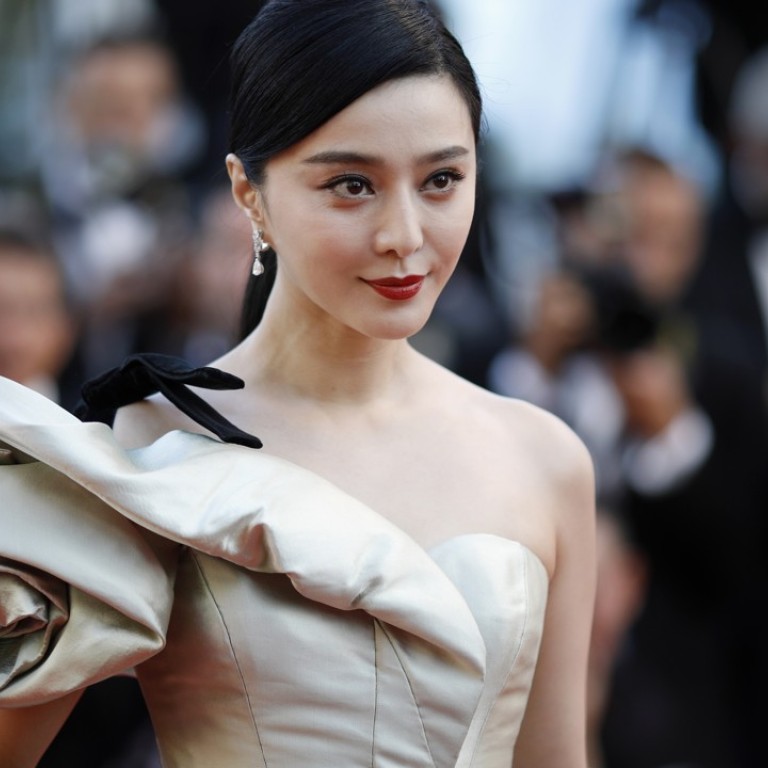
Mystery over disappearing Chinese newspaper report on X-men actress Fan Bingbing’s alleged travel ban
Several associates of country’s highest paid actress said to have been questioned by police since allegations were made
A mystery about China’s highest paid actress, Fan Bingbing – who appeared in X-Men: Days of Future Past – has deepened after a Chinese newspaper report claiming she was under a tax cloud and barred from leaving the country was suddenly taken offline without explanation.
Fan, who earns more than Hollywood star Jennifer Lawrence, is at the centre of an online debate over whether Chinese A-list stars earn too much and give back too little to the country.
While Fan, 36, has not been officially accused of any wrongdoing, prominent television host Cui Yongyuan, who is also a controversial, outspoken figure, alleged at the end of May that she was involved in “yin-yang” contracts, which are used to evade tax.
Fan’s studio rejected the allegations and said it would cooperate with the authorities. Tax officials are investigating but have not released any findings.
Fan topped last year’s Forbes list of best paid Chinese celebrities with earnings estimated at US$45 million.
On Saturday The Economic Observer, a respected Chinese-language newspaper, reported that Fan and her younger brother Fan Chengcheng, had been barred from leaving the country over alleged tax evasion. The reporter, Li Weiao, is an experienced investigative journalist in China and a finalist for last year’s Global Shining Light Award from the Global Investigative Journalism Network.
The story was widely shared before being pulled from the newspaper’s website an hour later.

A source in Beijing told the South China Morning Post that the actress and her brother had not been arrested. Fan is thought to have last been seen in public on July 1, when she visited a children’s hospital.
The last post on the actress’s personal microblog is dated June 2 and is about a charity programme that Fan took part in. The latest post on her studio’s microblog, Fan’s main channel to the public, was dated June 19 and is about the same charity work.
Phone calls to the public relations manager of Fan’s studio went unanswered on Sunday.
The Economic Observer, citing an unnamed source, said police had been involved in the tax evasion investigation since late June and had taken away a financial and auditing professional associated with a listed company for questioning. The person had been helping a company under Fan to handle the investigation and was suspected of hiding and destroying evidence, the source told the newspaper.
Several of Fan’s associates were also being investigated by police, according to the report.
It quoted an unnamed source close to the State Administration of Taxation as saying there had not been much progress in the investigation.
Listed entertainment giant Huayi Brothers said via the Shenzhen Stock Exchange on Sunday that the company was not involved in the reported investigation of Fan and was not the unnamed listed company in the Economic Observer report.
Say goodbye to Huallywood? The star tax probe clouding a Chinese city’s movie-making dreams
The State Administration of Taxation and Jiangsu’s provincial tax authority, which has been ordered to investigate the case, did not immediately reply to inquiries.
The practice involves the celebrity signing two contracts: one stating the real amount to be paid and another showing a much lower payment to be submitted to the tax authorities.
The contracts are illegal but reportedly common in everything from the property sector to soccer clubs. The authorities have launched various campaigns over the years to eradicate the practice but have been hampered by inadequate accounting systems and soft penalties.
The State Administration of Taxation did not name anyone when it announced the investigation, but it came after popular television host Cui spoke out about the dual-contract system.
Cui, who was a talk show host for China’s state television before resigning, posted a photo online of a document he alleged was a contract signed by Fan, stating she would be paid 10 million yuan (US$1.46 million) for a job. A second post showed what appeared to be another contract, though no details could be seen, which Cui said was linked to the first one and was for six times that amount – 60 million yuan. He did not name Fan in the second post.
Fan’s studio accused Cui of disclosing commercial contracts and denied that she had ever signed separate contracts for a single job.
The cap on film stars’ pay and the crackdown on tax evasion comes amid the ruling Communist Party’s clampdown on extravagance by officials and the country’s rich and famous, under which lavish banquets and even activities such as golf are frowned upon.

